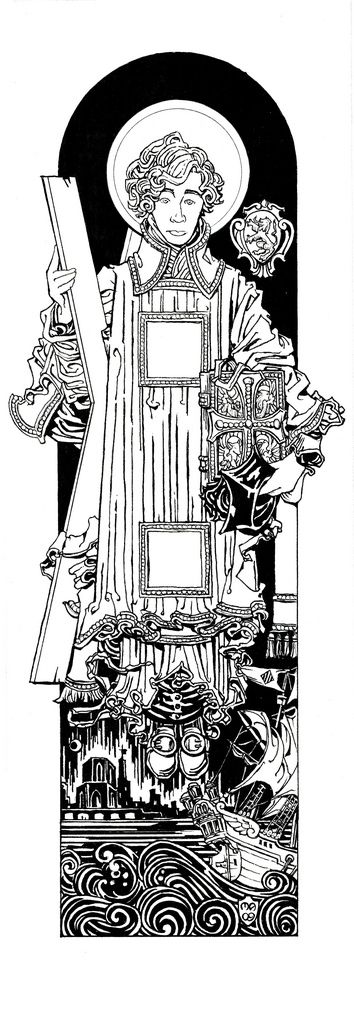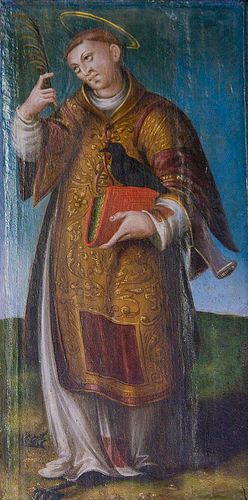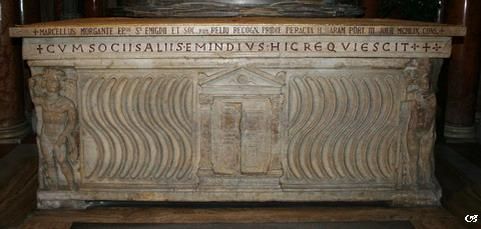"In this world you will suffer persecution," Saint Vincent once said to his disciples, adding to allay their fears, "but rest assured, I have conquered the world."
Today, January 22, we celebrate the feast of Saint Vincent the Deacon (also known as Vincent of Saragossa and Saint Vincent Martyr, died 304), willing martyr of the Church. Saint Vincent, when confronted with the most horrific tortures, held true to his faith, reminding us of the words of Saint Paul, “To you, it has been granted for Christ, not only to believe in him, but also to suffer for him.”
The life of Saint Vincent the Deacon has somewhat been lost to history. What we know comes from the hymnographer, Prudentius, who wrote a hymn detailing the Passion of Saint Vincent. In the writings of Saint Augustine, we learn that the Acts of the Saint Vincent’s Martyrdom were read throughout Africa as early as the fourth century, which would have occurred shortly following his death. Based upon his heroic courage and defense of the faith, devotion to Saint Vincent the Deacon quickly spread throughout the Church following his death.
As recorded by Prudentius, Saint Vincent was born at Saragossa, Spain to a respectable family. He studied under the tutelage of Valerius, Bishop of Saragossa, and was found to be an exceptionally pious and bright young student. Bishop Valerius, due to a speech impediment, was unable to preach effectively, and thus appointed Vincent as Deacon, allowing him to both preach and speak for the bishop.
At that time, the wicked Emperor Dacian had undertaken his vigorous persecution of Christians, and the bishop was summoned before him. Now willing to leave his friend and bishop, Saint Vincent accompanied him. There, the two brave men were urged to recant their faith and sacrifice to the Roman pagan gods. Vincent, speaking for the pair, refused. As recorded by Prudentius:
In answer Vincent then cries out,
A levite of the sacred tribe,
Who at God's altar stands and serves,
One of the seven pillars white:
'Let these dark fiends rule over you,
Bow down before your wood and stone;
Be you the lifeless pontifex
Of gods as dead as you, yourself.
'But we, O Dacian, will confess
The Father, Author of all light,
And Jesus Christ, His only Son,
As one true God, and Him adore.'
Both Vincent and Valerius were imprisoned in Valencia. They were subjected to hunger and torture, which failed to break them. Over time, Vincent succeeded in converting his jailor, as did many saints and martyrs under similar circumstances. Eventually, Bishop Valerius was sent into exile, but Emperor Dacian insisted that Vincent—who had spoken so eloquently against him—remain to suffer the full force of his torture.
Saint Vincent was mercilessly tortured, first upon a hot grate, then over a burning fire. When none of these tortures elicited the result Dacian wished, he had the torturers beaten for failure and to encourage them to utilize more aggressive methods. Saint Vincent was given more time on the gridiron, and his sides were raked with metal hooks. Still, he held firm in his faith, and was thrown back into his filthy jail cell—a cell that had been lined with straw and shards of broken pottery.
The emperor then, weeping with bitterness at his failure, did something strange. He ordered that Saint Vincent be moved from his cell to the most luxurious accommodations in the city, with a comfortable bed and decent food. His hope was to shake the saintly man’s constancy. After a day in comfort, Dacian threatened to send Vincent back to the prison, unless he recanted the faith and burned the Scriptures in a fire. Of course, Vincent refused, and was subsequently executed.
According to Holy Legend, his badly beaten body was thrown to be devoured by vultures, by the Lord sent a raven to defend the body from desecration. Instead, the emperor had the body cast into the sea, where it washed upon the shore and was buried by a pious widow at a place now referred to as Saint Vincent’s Cape. The grave was subsequently guarded by a flock of ravens until a chapel was built over his remains. In the twelfth century, the relics of Saint Vincent were translated to Lisbon, Portugal where they are venerated at the Monastery of São Vicente de Fora.
Saint Vincent the Deacon is the most renowned martyr of Spain. He is represented in art wearing the dalmatic (wide sleeved over-garment slit up the sides) of a bishop, accompanied by a raven (who valiantly defended his body after death), a cross (his comfort), a grate, or a fire-pile (instruments of his torture). Saint Vincent is the patron saint of many Spanish and Portuguese cities, as well as the patron saint of winemakers, bricklayers, and deacons.
The life of Saint Vincent- like that of all Church martyrs—inspires us to live a more perfect and holy life, one in which we equally value the love we are given by the Lord and the call to suffer for Christ. We pray for the intercession of Saint Vincent Martyr that we may find the courage and the endurance to withstand the evils and judgments of the world, holding firm to our faith as was his model for us.
Saint Vincent's Prayer for Deacons
Holy God, Saint Vincent served You as a permanent deacon and gave his whole life and soul to You, even to the point of becoming a martyr. I lift up to You the deacons of the Church and all those who are being called by God to become deacons. Guide them as they discern how to serve the Body of Christ. Prevent the attractions of the world and the busyness of secular jobs from interfering with their vocations. Teach them to grow in humility. Help their families learn from their examples and support their deaconates with trust and joy. Saint Vincent, pray for us. Amen.
Eternal Father,
You gave Saint Vincent
the courage to endure torture and death for the Gospel:
fill us with Your Spirit
and strengthen us in Your love.
We ask this through our Lord Jesus Christ, Your Son,
who lives and reigns with You and the Holy Spirit,
one God, for ever and ever. Amen.
















No comments:
Post a Comment
Thanks for leaving a comment. If you wish to submit a prayer request, however, please do so above, using the "Contact" tab.